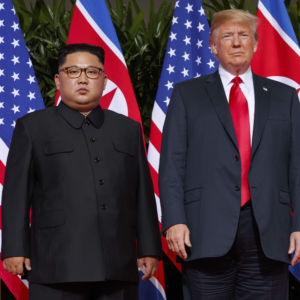Stephen King, author of global best-selling novels of horror and fantasy, has written about the craving for horror stories, books and films. He thinks all of us are more or less “mentally ill,” but most of us hide or sublimate our worst instincts. From there he tries to answer why we sit through horror movies that frighten us.
King digs deep into what motivates people. A horror movie, he says, has “a dirty job to do.” It “appeals to all that is worst in us,” “our nastiest fantasies.” He sees tales of horror as devices to hold our cravings in check, satisfying inner desires, feeding evil spirits in fiction rather than real life. A master of hyperbole, King no doubt has a point. After watching horror on film, he believes we should get over it. Optimistically, he evokes the message of the Beatles song, “All you need is love.”
In the real world of conflict and confrontation on the Korean Peninsula, the threat posed by North Korean nukes and other weapons of mass destruction has seemed like the stuff of nightmares. Some day we hope to wake up, look around and see a society that, to outward appearances, is normal. We are so accustomed to the apparition of horror posed by North Korea that we often pay no attention to it. Yet we know it’s there, and we imagine forms of attack far more devastating than any of the terrible weapons deployed in the Korean War.
Could we now be awakening from the nightmare that’s been hanging over the daily lives of everyone in Korea since the North Korean invasion of June 1950? President Moon Jae-in’s three meetings with Kim Jong-un, most recently this week in Pyongyang, suggest the bad dream is over and the 80 million people in North and South Korea can forget about a war in which tens of millions might die ― many more than the 3-4 million killed in the horrors of the Korean War.
As we look back on the constant fear that is always with us, the fantasy of death and destruction beyond imagination, we wonder if the cloud is lifting and the two Koreas can get along while the armies of their allies, the U.S., ready “to fight tonight” for the South, the Chinese, poised to intervene as they did in 1950, forget about a second Korean War.
Actually, by no means is the bad dream over. We can be pretty sure they’re not going to be used any time soon, but we still have no assurance North Korea is giving up its nukes, much less the horde of biological and chemical weapons that doesn’t seem to have come up for discussion.
I vividly remember we had high hopes after Kim Dae-jung flew to Pyongyang to see Kim Jong-il in June 2000 for the first inter-Korean summit. Hopes were revived when DJ’s successor, Roh Moo-hyun, went there for the second such summit in October 2007 one year after the North’s first nuclear test.
The most memorable result of the Kim and Kim summit was agreement on reunions of families divided by the Korean War, but so far there have been only 21, the latest last month. It’s hard to remember what came out of the Roh-Kim summit beyond generalities, but they did come to some understanding on North Korea’s claims to waters off the west coast. That one fell apart totally when a North Korean mini-sub torpedoed the corvette Cheonan in March 2010, killing 46 sailors.
The test of this week’s Moon-Kim summit, their third since Kim stepped across the line and met Moon at the truce village of Panmunjeom on April 27 but their first in Pyongyang, will not be whether the North gives up its nukes and missiles and the facilities for making them, as the Americans demand and the North Koreans are not going to do, but whether they can fulfill lesser deals. For instance, the South Koreans are closing some of their guard posts south of the military demarcation line, as agreed Wednesday, but who knows what the North Koreans are doing?
Oh, and two or three other issues either never arose or were swiftly brushed aside. The North Koreans are saying nothing about withdrawing several hundred thousand troops within striking distance of the South or pulling back several thousand missiles that could rain fire and fury on the Seoul-Incheon megalopolis, just as President Donald Trump famously threatened last year to do to the North. And it would be extremely impolite to breathe a word in Kim Jong-un’s presence about systemic human rights abuses, notably to several hundred thousand prisoners consigned mostly for badmouthing Kim, to spend the rest of their shortened lives within the North’s sprawling gulag system.
Hope, however, springs eternal. We’ll know more when or if Kim pays a return visit to Seoul, as Moon said was agreed. It would be nice to think Jong-un was doing more to bring about reconciliation than did his late father, Kim Jong-il, who promised to see Kim Dae-jung in Seoul but never made it. As in denuclearization, the proof lies in deeds not words.

